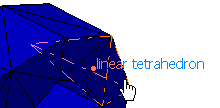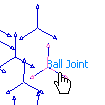Images | ||
| ||
Image Edition

- Automatic preview mode
-
This option lets you preview automatically the changes
you done in the Image Edition dialog box.
If this option is deactivated, the Preview button will be available in the Image Edition dialog box: the visualization will be launched only if you click the Preview button.
This option may be useful if you work with large models because some parameters could take time to be taken into account. In this case, deactivate the Automatic preview mode option.
 By default,
the Automatic preview mode option is activated.
By default,
the Automatic preview mode option is activated.
![]()
Text Properties

You can set the text properties in the case of:
- Text images
- Text displayed when you move pointer over a
displayed image.
For example:
- over a Fringe
image:

- over a Symbol
image:


- over a Fringe
image:
- Symbol images with Text option.
- Size
-
This option lets you specify or not the size of the text.
- Default: lets you visualize the text values with a default size. In this case, the text is not zoom-sensitive.
- Specify: lets you specify the size
of the text values.
Important: The text size on the screen is arbitrary fixed and cannot exceed a certain limit even if you specified a large size value. Specifying a large size value can be useful if you need to zoom out and keep the text displayed with a large size.
Example with a text image type:
- Default size

- Specified size (equal to 3)

 By default,
the Default option is selected.
By default,
the Default option is selected. - Stacking
- This option lets you specify the stacking of the text.
- Horizontal: lets you display the text horizontally.
- Vertical: lets you display the text vertically.
Example with a text image type:
- Horizontal stacking (default)

- Vertical stacking

 By default,
the Horizontal option is selected.
By default,
the Horizontal option is selected.
![]()
Image Templates

The SPMUserTemplateImageDefinition.xml file contains all the generated images that have been saved using the Save As Template command. You can define the location of this file and manage it.
- Output directory
- This option lets you choose the directory in which you
want to store the .xml file.
 By default,
an output directory is indicated in the
Output directory box (temporary folder).
By default,
an output directory is indicated in the
Output directory box (temporary folder). - Template file
- This option indicates the name of the associated .xml file. You can rename or remove the stored images by clicking the Manage button.